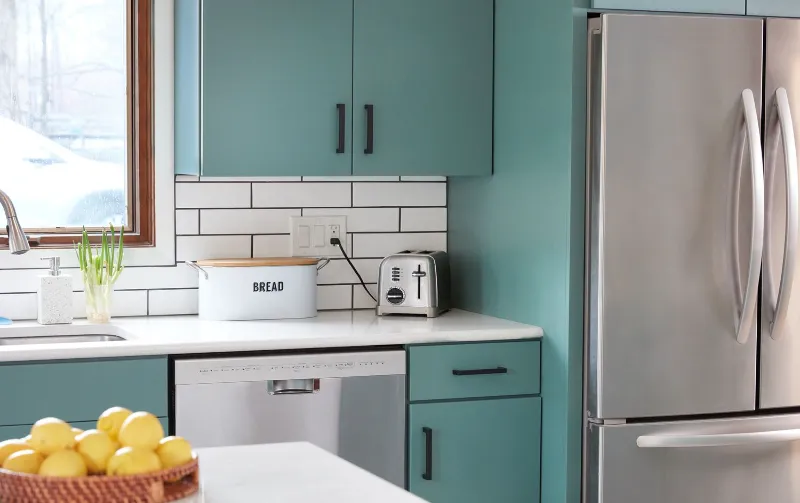Can a Fridge and Dishwasher Be on the Same Circuit?: Safety Tips
We may earn affiliate fees for purchases using our links (at no additional cost to you).
No, a fridge and dishwasher should not be on the same circuit. They both require significant electrical loads that can trip breakers if combined.
Understanding the electrical demands of household appliances is crucial for home safety and efficiency.
The refrigerator and dishwasher are two common kitchen appliances that play vital roles in daily life, but they also draw substantial power.
Running them on the same circuit can lead to potential electrical hazards, such as tripped circuit breakers or even the risk of fire.
Each appliance typically requires a dedicated circuit to handle its electrical load safely.
Building codes often reflect this necessity, emphasizing the importance of separate circuits to accommodate the power needs and safety requirements of these appliances.
Following these guidelines helps ensure that your kitchen operates smoothly without overloading your home’s electrical system.

Safety Guidelines For Fridge And Dishwasher Circuit
Understanding the circuit capacity and load assessment is crucial when determining if a fridge and dishwasher can share a circuit.
It’s essential to ensure that the combined power consumption of both appliances does not exceed the circuit’s capacity, commonly 15 or 20 amps in most home kitchens.
An overloaded circuit could lead to electrical fires or appliance damage. Appliances should ideally have separate circuits to prevent overloading.
For wiring and outlet compatibility, it’s imperative to use appropriately rated wires and outlets that can handle the electrical needs of both appliances.
Using mismatched outlets can pose serious safety risks.
Typically, a refrigerator requires a dedicated 20-amp circuit, while a dishwasher can often share a circuit with a garbage disposal or other light appliance, but never another major load like a fridge without potentially causing circuit trips.
Ensuring the installation of a Ground Fault Circuit Interrupter (GFCI) is important for both safety and compliance with electrical codes.
GFCIs are designed to protect against electrical shock by breaking the circuit when a disparity in the electrical flow is detected, which is especially beneficial in areas with high moisture, such as kitchens.
Is It Safe To Share A Circuit?
Sharing a circuit between a fridge and a dishwasher is generally not advised due to the electrical requirements of these large appliances.
Each has its own power needs, with refrigerators requiring a steady supply of electricity to maintain low temperatures and dishwashers using significant amounts of power during cycles involving heating water and drying dishes.
Connecting both appliances to a single circuit could result in potential overload risks.
An overload occurs when the combined electrical consumption of both appliances exceeds the circuit’s capacity, which not only poses a risk of tripping the circuit breaker but also creates a potential fire hazard.
Electrical codes often require that such heavy-duty appliances have dedicated circuits to avoid these risks.
Alternatives And Best Practices
Ensuring that each major appliance has a dedicated circuit is vital for home safety and compliance with electrical codes.
Typically, a refrigerator requires its own 15-20 amp circuit and a dishwasher commonly requires a different 15-20 amp circuit.
Having both on the same circuit can lead to overloaded circuits, potential tripping of circuit breakers, and an increased risk of electrical fires.
Consider seeking advice from a licensed electrician who can evaluate your home’s electrical load and recommend the best course of action.
It may be necessary to upgrade the electrical system to accommodate additional circuits, especially in older homes that weren’t designed with modern electrical demands in mind.
This upgrade could involve enhancing the electrical panel or adding new wiring to ensure that each appliance operates safely and efficiently on its own dedicated circuit.
Frequently Asked Questions On Can A Fridge And Dishwasher Be On The Same Circuit
Is It Safe To Combine Appliances On One Circuit?
What Electrical Codes Apply To Kitchen Circuits?
How Many Amps Does A Kitchen Circuit Need?
Can A Dishwasher And Fridge Share A 20-amp Circuit?
Conclusion
To sum up, linking your fridge and dishwasher on a single circuit is risky.
Electrical codes typically advise against it to prevent overloading and hazards.
For optimal safety and functionality, assign separate circuits.
Prioritize this electrical setup during your kitchen design or renovation for peace of mind.